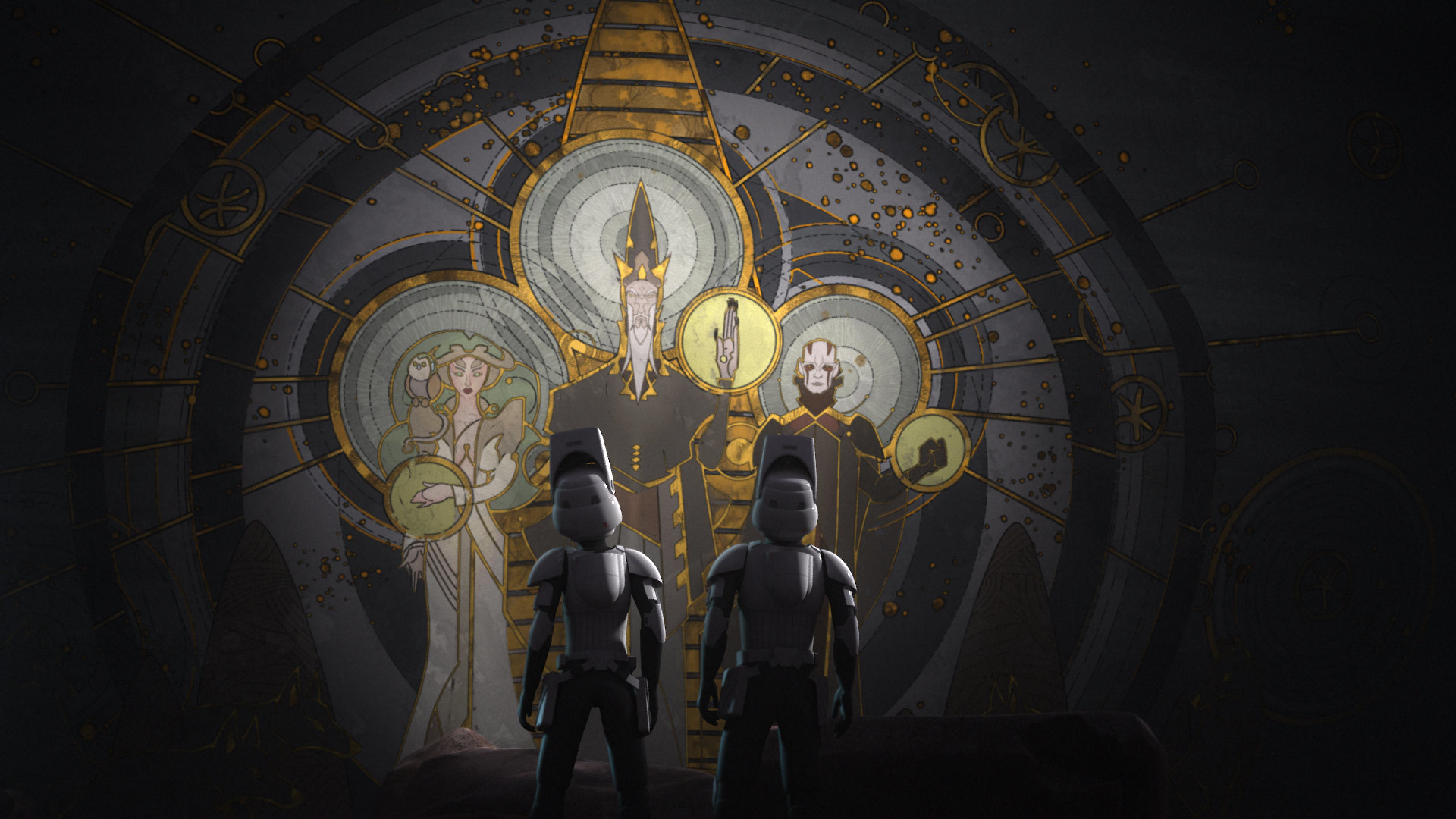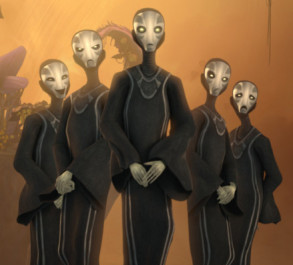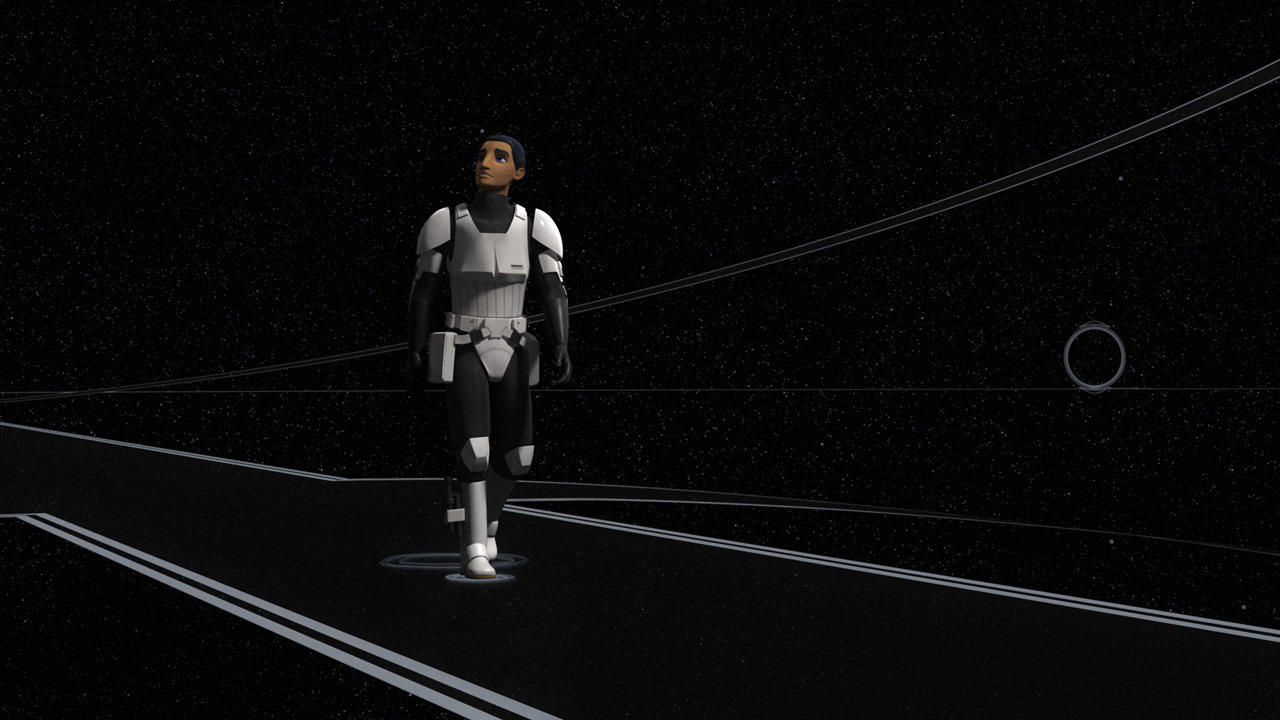
It’s no secret that when it comes to Star Wars, Dave Filoni is not shy about putting the “fantasy” in “space fantasy”. Between the numerous Tolkien allusions to interviews discussing his love of Miyazaki, Filoni has always placed a high importance on the fantasy elements of the Star Wars universe—namely, the Force. Both The Clone Wars and Rebels were not afraid to mix the more standard military stories with highly fantastical detours to strange and bizarre worlds that seemed to upend everything we knew about the Force.
And it’s therefore generally met by the fandom with a not-insignificant amount of skeptical eyebrow raises. While Yoda’s encounter with the five Force priestesses in the TCW Lost Missions was more or less well-received, the Mortis arc was firmly a “love it or hate it” storyline in the fandom, and Ezra’s experience in the portal universe is looking to be similarly divisive. It’s weird and confusing and doesn’t make a lot of sense at first blush…but I’d argue that’s exactly why Dave Filoni has the best approach when it comes to depicting the Force.
Every Star Wars fan, from the most casual to the diehard, can probably tell you what the Force is. Obi-Wan tells us:
Well, the Force is what gives a Jedi his power. It’s an energy field created by all living things. It surrounds us and penetrates us; it binds the galaxy together.
And then later, we learn from Yoda:
Life creates it, makes it grow. Its energy surrounds us and binds us. Luminous beings are we, not this crude matter.
Both are concise and, on the surface, simple explanations. The Force is the energy within all living things and connects them together, even if they can’t sense it. But what does that actually mean? The simplicity of Obi-Wan and Yoda’s teachings shouldn’t be confused to mean the Force itself is easily understood or even that we know all there is to know about it. Sometimes it’s weird, sometimes it makes no sense, and sometimes it seems like something that came out of a fever dream. But that’s the fun of it, that it’s so much more complicated than mind tricks and telekinesis.
In fact, the Force is the most powerful and complex part of Star Wars; nothing about that is easily defined! The more we learn about the Force, the more we realize just how little we know. It isn’t able to be neatly explained with labels and categories, nor is it a mathematical equation where balance means an equal number of Jedi and Sith. That was the point of Rey’s lesson with Luke after all: the Force doesn’t belong to the Jedi or the Sith. It’s so much bigger than that.
 Thanks to Filoni’s work on both animated Star Wars shows we’ve gotten a taste of just how much bigger the Force can be. The Force is not just the Jedi and the Sith; from the Bendu to Mortis to the spirits Yoda meets on his quest for knowledge of life after death, there are beings who have found a way to commune with the Force so deeply they’re no longer considered human. And there are innumerable abilities that call on the mysteries of the Force, from the dark side necromancy of the Nightsisters to the phase-walking of the loth-wolves. Like Luke says, the Force is not just about controlling people or making things float. It is physical, it is living, it is unifying, and it is cosmic.
Thanks to Filoni’s work on both animated Star Wars shows we’ve gotten a taste of just how much bigger the Force can be. The Force is not just the Jedi and the Sith; from the Bendu to Mortis to the spirits Yoda meets on his quest for knowledge of life after death, there are beings who have found a way to commune with the Force so deeply they’re no longer considered human. And there are innumerable abilities that call on the mysteries of the Force, from the dark side necromancy of the Nightsisters to the phase-walking of the loth-wolves. Like Luke says, the Force is not just about controlling people or making things float. It is physical, it is living, it is unifying, and it is cosmic.
Not even the movies have really delved deeply into the mystical and cosmic nature of the Force. Luke’s lessons with Yoda (and later, Rey’s lessons with Luke) have given us the broad strokes of the philosophy of the Force, but it’s the TV shows that are taking the time to explore the implications. The Force is an energy field that binds the galaxy together, says Obi-Wan, and that means so much more than just being able to sense others and have heightened physical abilities. The world-between-worlds that Ezra travels to is a natural extension of Obi-Wan’s definition; if the Force binds the galaxy together then of course there’s a way to tap into that massive power and see the connections between time and space. Isn’t it just the same as Kylo and Rey’s connection throughout The Last Jedi, writ large on a cosmic scale?
The Force is what sets Star Wars as a franchise apart. It’s not just about space battles and the fight between good and evil (though that is certainly a large part); it’s about all that entwined with the philosophy of this deep cosmic power. It’s a tough balance to strike (and admittedly Filoni falls short at times; the tone whiplash on Rebels from episode to episode can be quite strong) but out of all the current canon and creators, Filoni is far and away doing the most interesting things with the Force. He and the team behind TCW/Rebels are not only adding to the rich lore of the franchise, but also expanding the possibilities and potential of the most unique aspect of the Star Wars universe.

And at the end of the day, I’d much prefer we take storytelling risks and push the limits of worldbuilding rather than stick to the safe status quo. Force users have always been legends in the GFFA, both heroic and nightmarish, so why shouldn’t storytellers push the envelope of what we know of the Force? The idea that no Force user has achieved the ultimate potential of their powers—or indeed that we might not know, nor ever find out, what that ceiling is—is vastly more interesting than the idea that the Jedi spent centuries at study and are now really good telepathic karate guys. The Force is so much more than that, and right now Filoni is the only one really diving into the implications of what that means.
Star Wars is weird and there’s always room for more weirdness. Filoni’s approach to the mysticism of the Force is what the franchise needs in order to keep things fresh and moving and not fall into the comfortable rut of the expected. Not every idea will be a winner, but his willingness to grapple with the fantastical possibilities of what the Force can do and be opens up worlds of possibilities for future storytellers. Let’s just hope more of them choose to pick up those threads.

I’ve never liked Mortis, or the Force Priestesses, or the Bendu as I feel they make the Force too much like the Abrahamic God. Star Wars has always been Fantasy but it was always its own kind of Fantasy. The more mystical stuff, all the godlike entities, just makes it seem like a generic ripoff of classic (and better written) fantasy stories.
Stuff about the afterlife also raises a whole bunch of existential questions – which I guess Lucas began – about how much people ‘merge’ with the Force, or should merge with it; matter, spirit and other complicated issues that still beset western metaphysics to this day, along with what can be labelled ‘natural’ after that. We’re a long way from the simple phrases of Yoda about seeing ‘all friends long gone’ here.